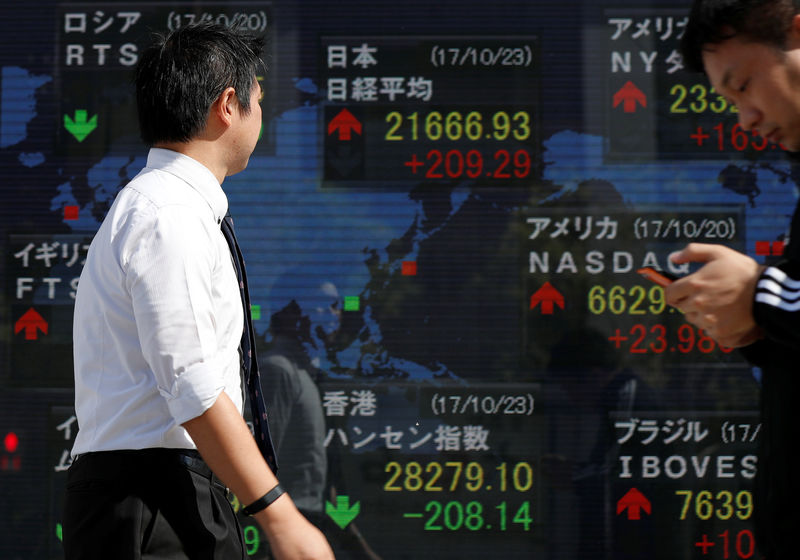By Shinichi Saoshiro
TOKYO (Reuters) - Asian stocks mostly rose on Tuesday, shaking off downebeat factory readings out of China, while the dollar sagged after investigators probing Russian interference in the 2016 U.S. election charged President Donald Trump's former campaign manager.
Spreadbetters expected Britain's FTSE (FTSE) to open a shade lower and France's CAC (FCHI) to open flat. The German markets will be shut for a national holiday.
MSCI's broadest index of Asia-Pacific shares outside Japan (MIAPJ0000PUS) was up 0.4 percent.
Strong gains in South Korea and Taiwan, which make up roughly a quarter of the index's weighting, helped offset weakness in China and Hong Kong.
The KOSPI (KS11) ended up 1 percent at a record high after Seoul and Beijing agreed to normalise relations that have been strained by a year-long standoff over the deployment of a U.S. anti-missile system in South Korea.
"Shares that have long been pressured by ongoing political disputes between the two countries are reacting positively to the announcement, including Hyundai Motor-related stocks," said Cho Byung-hyun, a stock analyst at Yuanta Securities.
Tech-heavy Taiwan (TWII) added 0.4 percent after Apple (O:AAPL) made big gains overnight.
But Chinese equities wobbled after data showed a sharper-than-expected slowdown in October factory growth.
Beijing's war on winter air pollution is forcing many northern steel mills, smelters and factories to curtail production, adding to uncertainty amid early signs of a slowdown in the world's second-largest economy.
China's blue-chip CSI300 index (CSI300) fell 0.2 percent and Hong Kong's Hang Seng (HSI) dipped 0.1 percent.
Japan's Nikkei (N225) closed flat, capped by weaker U.S. shares and a stronger yen.
Wall Street pulled back from record-high territory on Monday, weighed down by a drop in drugmaker Merck (N:MRK) and a report that U.S. lawmakers are discussing a gradual phase-in corporate tax cuts rather than reducing it all at once. (N)
"The report of the gradual corporate tax cut option came when equities were strung high, so it served as a catalyst for markets to adjust," said Masahiro Ichikawa, senior strategist at Sumitomo Mitsui Asset Management in Tokyo.
"Expectations were for the corporate tax to be cut in one go. But even if the cut is implemented gradually, it still is a reduction and that won't be bad news in the long term."
The dollar hovered near a 10-day low of 113.02 yen
The greenback lost about 0.4 percent against the yen overnight on investor caution after former Trump campaign manager Paul Manafort and another aide, Rick Gates, were charged with money laundering on Monday by federal investigators.
"It's weighing on dollar/yen a little bit. I think there's a little bit of uncertainty," said Stephen Innes, head of trading in Asia-Pacific for Oanda in Singapore, adding the yen drew some support as risk sentiment was looking a bit wobbly.
The yen showed little reaction to the Bank of Japan's decision to stand pat on monetary policy even as it slightly cut its inflation forecast for the current fiscal year, an outcome that had been widely expected.
The U.S. currency was also pressured as Treasury yields slipped on reports that Trump is likely to appoint Federal Reserve Governor Jerome Powell, who is viewed as more dovish than other contenders, as the next head of the Federal Reserve.
The 30-year Treasury bond yield (US30YT=RR) fell to its lowest in a week after Bloomberg quoted Treasury Secretary Steven Mnuchin saying the government does not see a lot of demand for ultra-long bonds.
The dollar index against at basket of six major currencies (DXY) steadied at 94.547 after slipping overnight from a three-month high of 95.150.
The euro was little changed at $1.1637
European markets got a lift on Monday after an opinion poll showing waning support for independence soothed investors' concerns over a Catalan secession from Spain.
Crude oil prices steadied below their recent peaks after being boosted by expectations OPEC-led production cuts would be extended beyond March. [O/R]
Brent crude futures (LCOc1) was down 0.2 percent at $60.78 a barrel after rising to $61 overnight, the highest since July 2015.

U.S. crude (CLc1) was 0.1 percent lower at $54.09 after touching $54.46, its highest since late February.